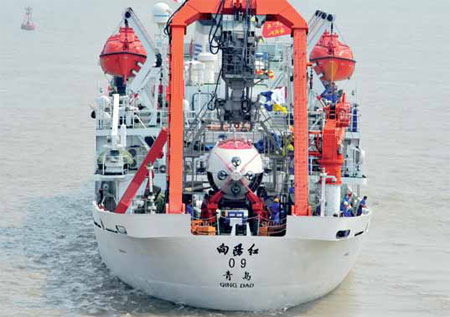IN BRIEF (Page 2)

| Xiangyanghong 09, a scientific exploration ship, carries the Jiaolong, China's manned deep-sea submersible, after leaving the eastern port city of Jiangyin on June 3 for the Mariana Trench to attempt the world's deepest manned submersible dive. Zhou Kun / for China Daily |
Technology
High hopes for deep-sea mission
The manned submersible, Jiaolong, could put China at the forefront of deep-sea exploration if attempts to dive to 7,000 meters are successful this month, a senior official involved in the project said on June 3.
The vessel's crew, who on previous missions passed 5,000 meters, will bid to make history with a series of tests in the Pacific Ocean starting June 10.
"If it reaches the new target, it will represent major progress," said Liu Feng, deputy director of China Ocean Mineral Resources R&D Association, which planned the mission with the State Oceanic Administration.
After the dive, Jiaolong will be put into use to conduct deep-sea scientific research, such as exploring for natural resources and underwater environmental surveys.
Insurance
Simplified insurance for foreigners
Social insurance payments, for foreigners in China and Chinese citizens working overseas, will be simplified under international agreements currently being discussed, a senior social security official said.
"We've held three rounds of talks with Japan and one round with France, and we have also held initial discussions with Sweden and Belgium," said Xu Yanjun, deputy director of the Social Insurance Administration under the Ministry of Human Resources and Social Security.
Xu said 11 countries, including Finland, Singapore, Denmark, Spain and Switzerland, have expressed their willingness to negotiate with China since the new regulation, which stipulates that all foreigners working in China will be covered by social security, took effect on Oct 15, 2011.
China's Social Insurance Law gives foreign workers retirement, medical, work-related injury, unemployment and maternity insurance similar to those for Chinese citizens.
Education
Scots strengthen Confucius bonds
Scotland's First Minister Alex Salmond and Chinese Ambassador Liu Xiaoming joined guests at the European Confucius Institutes & Classroom conference, hosted by the University of Edinburgh, which opened on June 6.
The event brings together key stakeholders from Scotland and Europe with presidents of leading Chinese universities, including Fudan, Xiamen, Peking, Renmin and Nankai. Senior representatives from Chinese embassies and consulates across Europe are also attending.
The three-day event examines links between Scotland and China in areas such as education, business, language and culture.
"Scotland and China already share strong economic, cultural and educational links. The excellent work of Confucius Institutes is an increasingly important part of the bonds of friendship and understanding between our nations," said Salmond.
At the conference, the University of Edinburgh and Hanban, sponsor of the global network of Confucius Institutes and Classrooms, renewed their relationship in a signing ceremony that committed both sides to continue support to the Confucius Institute for Scotland.
Schools to give rugby a try
Thirty elementary schools in East China will get the ball bouncing soon on a new rugby program designed to boost the game and the health of students.
The schools in Nanjing, Jiangsu province, will begin teaching the sport in September.
"It aims to promote rugby in China, since the second Youth Olympic Games will be held in Nanjing in 2014," said Niu Yong, director of the Nanjing sports bureau's football management center.
China's first national youth rugby team was established in Nanjing in May 2012.
While popular in some countries such as the United Kingdom and Australia, rugby is not familiar to many Chinese people. The new program has created heated discussions among Chinese teachers and parents in that province.
Environment
Official warns of water pollution
An environment official on June 5 warned of pollution in China's rivers, lakes and seas, saying the problem in the inshore waters of major coastal economic zones is serious.
Deputy Minister of Environmental Protection Wu Xiaoqing said the quality of the inshore water of North China's Bohai Sea and the East China Sea as well as water in five of the nine bays along China's coast was "extremely poor".
Wu said at a news conference that the five bays include Bohai Bay, the Yangtze estuary, Hangzhou Bay in Zhejiang province, the Minjiang estuary in Fujian province and the Pearl River estuary in Guangdong province.
Culture
Ancient kilns discovered
Archaeologists have discovered six kilns that date back to the Sui Dynasty (AD 581-618) and Tang Dynasty (AD 618-907) in the city of Xingtai in North China's Hebei province.
Excavation work has revealed the tops of three of the kilns, which were discovered in Neiqiu county, said Wang Huimin, an archaeologist from the Cultural Relics Institute of Hebei.
Wang said tools and large amounts of glazed china were also found near the kilns.
Many ancient kilns and relics have been discovered in the county since the early 1950s.
Kiln technology first emerged in China during the late Southern and Northern Dynasties (AD 420-581), with usage peaking during the Tang Dynasty.
China Daily

(China Daily 06/08/2012 page2)
Today's Top News
- Xi calls for promoting volunteer spirit to serve national rejuvenation
- Xi chairs CPC meeting to review report on central discipline inspection
- Reunification will only make Taiwan better
- Outline of Xi's thought on strengthening military published
- Targeted action plan to unleash consumption momentum
- Separatist plans of Lai slammed































